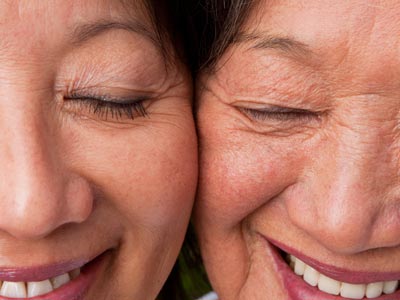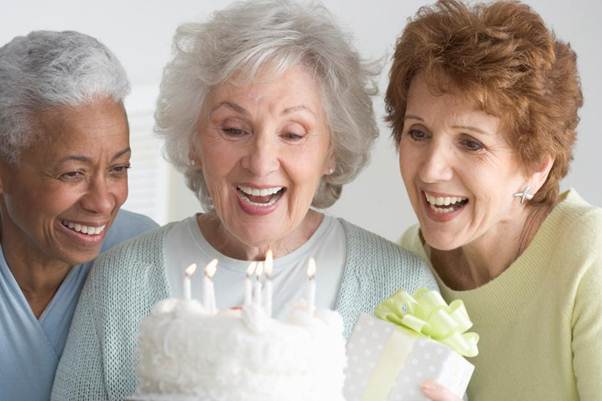You swore you’d never be one of those
women who freak out over every line and gray hair, yet here you are, doing just
that. You could blame it on vanity, but expert says the real reasons behind
your panic aren’t nearly so superficial.

Not long ago I went through a phase of
feeling bad about my looks. I mean really bad. We’re talking scrutinizing every
people in the mirror bad. Fantasizing about plastic surgery bad. And it was all
because some loose skin suddenly appeared under my chin. (I can’t bring myself
to say a word “wattle”.) I’d recently lost five pounds and was feeling pretty
good about my body. But at age 48, weight loss comes with a price. Not only was
my neck droopy, but my newly slimmed face looked more wrinkled, less firm. To
the untrained observer, the change was barely noticeable, but to my
hypercritical eye, the face straight back at me in the mirror was unfamiliar
and unattractive. I looked…old.
My reaction surprised me. I’d always vowed
to age with dignity, to embrace – or at least accept – wrinkles, brown spots
and even a little jiggle as the badge of a life well lived. Women of substance
aren't supposed to waste time searching the mirror for flaws. We get older and
wiser, not older and shallower. So why, now that my years were showing, did I
feel so unhappy and even a little ashamed?
“There’s never been as much pressure on
women to look young as there is today,” says Margo Maine, Ph.D., clinical
psychologist and author of The Body Myth: Adult Women and the Pressure to Be
Perfect. Because there are so many ways to fight aging – positions to erase
lines, injections to smooth furrowed brows and surgery to fix anything the
first two remedies can’t – the underlying message is that if you’re not talking
advantage of all the options available to you, you’re somehow letting yourself
go.
Feeling 30, Looking 50
Getting wrinkles doesn’t seem fair. Just
when you’ve hit your stride – happy with your career, comfortable with
motherhood and enriched by good friends – you glance in the mirror and see a
face that appears past its prime. It’s unnerving because you don’t feel old.
You’re fit, confident and active; you’re still shopping at The Limited, ogling
Ryan Gosling’s body at the movies and raising small children. No wonder, then,
that you fully expect your reflection to match your youthful self-image. And
when it doesn’t, you feel anxious but at the same time embarrassed that you
actually care about something so superficial.
With so many ways to fight aging, the underlying
message is that if you’re not taking advantage of all the options available to
you, you’re somehow letting yourself go
“I have a thriving marketing business and a
wonderful family, but there’s hardly a day that goes by that I don’t wish it
still looked the way I did 20 years ago,” says Ellen Frutchman, 57, of Toledo,
Ohio. “I’ve gained 25 pounds since I turned 30 and most of it has settled
around my stomach. I love who I am but I don’t love my body. I’m frustrated
with myself for not being able to lose weight – and equally frustrated that I
still think it’s important to be a size 6.”
“There’s real ambivalence about beauty
among women in their 30s, 40s, and 50s,” says Vivian Diller, Ph.D., a clinical
psychologist in New York City and co-author, with Jill Muir-Sukenick, Ph.D., of
Face It: What Women Really Feel as Their Look Change and What to Do About It.
“Most of us want to look as youthful and attractive as possible and yet we also
believe that anyone who is overly concerned about her look is shallow and
self-involved. That internal conflict makes it more difficult for some women to
sort their feelings toward aging.”
Part of the problem is that we’ve been
conditioned to equate attractiveness and youth with success, explains Ann
Kearney-Cooke, Ph.D., psychologist and co-author of The Life You Want: Get
Motivated, Lose Weight and Be Happy. “Older people aren’t valued in our
culture, so even though we know better, we worry that aging means we’re
becoming irrelevant.” For women who have spent their whole lives working out
and eating healthfully in the belief that they’d somehow stay eternally young
and fit, getting older feels like a scary loss of control.
$2.2 billion – the amount Americans spent on
anti-aging products last year.
Torri Chapel, 52, of San Anselmo,
California, explains her conflicted feeling this way: “Intellectually, I know
the most important things about me don’t have anything to do with my looks. But
I can’t get past the thought that is allowing myself to show my age is in
someway a personal failure.”
Botox and Beyond
Adding the pressure is the message women
get from the media to fight aging at all costs. There are a limited number of
female celebrities who have allowed themselves to enter the middle age
naturally. Mostly we see fortysomething who have nipped, injected and buffed
themselves into near flawlessness so they’ll look good in hi-def (and, sadly,
so they’ll keep getting roles). And like many Hollywood trends, the methods
they used to get that way have trickled down to us mere mortals. The American
Society of Plastic Surgeons reported that minor procedures like Botox
injections and wrinkle fillers are up 99 per cent since 2000. A recent Harris
Interactive poll found that if money were no object, almost half of women age
35 to 40 would have a tummy tuck and nearly a third would have liposuction.
When you see your co-worker or your best friend looking suspiciously “fresher”
after a trip to the dermatologist, you start to wonder, Why can’t I look
like that? “We tend to compare ourselves to other women, whether they’re
thin, beautiful stars or women we see every day,” says Laura Hensley Choate,
Ed.D., associate professor of counsellor education at Louisiana State
University. “That’s hard for women at any age, but it’s especially tough when
we’re entering midlife and your body and face are going through natural
changes.”
“I don’t think that saggy skin is appealing on
anything but shar-pei, but neither is a morose, self-critical attitude.”
The conflicting
emotions about aging can also lead women to lie about work they’ve had done or
to judge women who are open about it. Nancy Fagan, 47, of San Diego, owns up to
the fact that she gets regular Botox injections to erase the deep frown lines on
her forehead as well as Restylane fillers to plump up the lines around her
mouth. “But I’ve had friends tell me I should see a therapist, because I must
have low self-esteem,” she says. “That couldn’t be further from the truth. I’m
just trying to be the best me.”
Is a woman of substance allowed to do such
things? “Absolutely,” says Dr. Diller. “Caring your looks shouldn’t be
dismissed as completely trivial. But it shouldn’t be an obsession either. You
think you’d look better without droopy eyelids, there’s no shame in getting an
eye lift. But if you hate lots of things about your looks and are extremely
self-critical, no cream or surgery is going to change it. That’s something you
need to fix from the inside.”
Keeping It Real

Achieving that delicate balance comes down
to finding perspective and exploring why you feel anxious about letting your
age show. When Carolyn Comeau, 51, of Asheville, North Carolina, was going
through chemotherapy four years ago, she swore she would never complain about
wrinkles again. “Wrinkles mean I’m aging, and that’s a very good thing when you
consider the alternative,” she says. But now that she has been cancer-free for
quite some time, she’s noticed that her vanity is starting to get the better of
her occasionally. “After chemo my hair grew back totally gray, and that was a
little shocking,” she says. “I decided not to color, because my desire to be
authentic out-weighed any concerns I have about my looks. But I feel
self-conscious about being an older mom – I have to preteens – especially since
I am surrounded by so many dewy, bright-eyed women in their 30s.” That said,
Comeau has chosen a creative way to cope with the occasion bout of insecurity.
“I like to play up my individuality by wearing clothes that are colourful and
slightly edgy. Having gray hair has become part of my unique look.”
Likewise, Peggy Benson, 55, of Albuquerque,
thinks she looks young for her age but can’t ignore the tell-tale signs: crepey
skin on her neck, extra 20-plus pounds around her middle. She does wear drapier
clothes and scarves to camouflage those areas, but that’s as far as she’s
willing to go. “I feel like our culture has become too reliant on surgery to
fix things that aren’t necessary broken,” she says. “Besides, I’ve seen women
with face-lifts who ended up looking like they were wearing a mask. I’d rather
have wrinkles.”
As for me, I’m gradually adjusting to the
way I look today. I still don’t think saggy skin is appealing on anything but a
shar-pei, but neither is a morose, self-critical attitude. For now I’m
investing in good face cream and being more diligent about sun scream. And in
the meantime I’m working to find the sweet spot – the place where healthy
upkeep meets sensible self-acceptance, the place where I look like an older,
but still attractive, version of me.